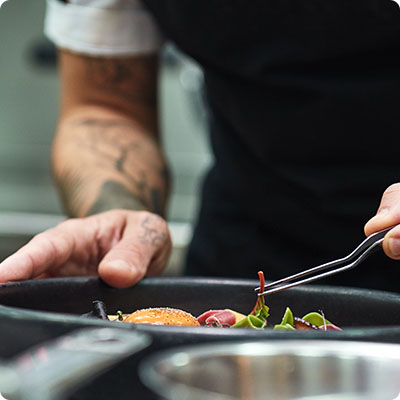A short history of Buddha
In the middle of the 6th century BC, in Kapilavitsu, in the foothills of the Himalayas, Prince Siddhartha of the Câkya dynasty was born. He lived the youth of a prince of royal blood, but four encounters (an old man, a sick man, a dead man and a monk) showed him the vanity of his princely life. At the age of 29, Prince Siddhartha Gautama abandoned his father's palace to lead the life of an ascetic in search of truth. After years spent studying Indian philosophy and practicing asceticism, a meditation lasting several weeks under a fig tree in Bodh Gaya enabled him to attain Enlightenment: having discovered the source of suffering in desire and its remedy in renunciation, he then became Buddha and preached this truth for the rest of his life: "These are the five rules of your daily life: be compassionate and respect the smallest life. Give and receive freely, but take nothing unduly. Never lie, even on occasions that seem to absolve lying. Avoid drugs and drink. Respect women and commit no illegitimate or unnatural act." He founded the community of monks, established the rule that frees us from the need to be reborn after each life into new pain and death, and entered Nirvana at the age of 89, in the year 476 BC.
Cambodian Buddhism
Hinayana (or Theravada) Buddhism is the earliest form of Buddhism. It became established in Cambodia in the early 14th century, succeeding the Mahayana form which included the worship of the Angkor god-kings. The adoption of Hinayana Buddhism must be seen as a kind of collective renunciation of greatness; a whole people exhausted by centuries of war rejected the Mahayana of King Jayavarman VII to adopt a much less demanding form of religion. Hinayana is the expression of original Buddhism. Unlike the Mahayana (Tibet, China, Japan, Vietnam), it does not believe in the existence of Buddhas and Bodhisattvas, but in the historical Buddha, Sakyamuni. In Cambodia, Buddhism is strongly tinged with Brahmanic survivals and magical practices inherited from various influences. Theravadin Buddhist monks are not priests, they don't act as intermediaries between man and a deity, they don't offer sacrifices and they can leave the monastery and the saffron robe whenever they wish. Buddhist monks take a vow of poverty and must not possess any possessions. His food and clothing must be given to him by the faithful in the form of alms. Every morning, he goes around the village to silently beg for the day's food. He eats only one meal a day, and after midday must abstain from all solid foods. He also takes a vow of chastity, and must do nothing that would put him at risk of not remaining chaste. Finally, the monk must practice non-violence, not only towards men but towards all living beings.
Islam
Islam is represented in Cambodia mainly by the Cham ethnic minority, most of whose representatives identify themselves as followers of Mohammed. Numbering between 150,000 and 200,000 in 1975, Cambodian Muslims were persecuted by the Khmer Rouge. Today there are some 370,000, most of them Sunni Muslims. The Chrouy Changvar peninsula near Phnom Penh is considered to be the Islamic spiritual center of Cambodia, and several high-ranking religious dignitaries reside there. Every year, a number of Chams travel to Malaysia to study the Koran or on pilgrimage to Mecca. A distinction is made between the traditionalist Chams, who practice a tolerant Islam blended with local beliefs, and the orthodox Chams, who are close to the Malaysian community and have adopted a more rigorous Islam close to the Holy Book.
Christianity
The first attempt to Christianize the country, led by a Portuguese Dominican priest in the mid-16th century, proved a failure, as Cambodia was too attached to its local beliefs, and more loyal to its king than to any religion. French colonization had no further effect. Yet by 1953, there were some 200,000 Christians in the country, including 50,000 Vietnamese, making it the country's second-largest religion. It's very difficult to quantify the number of Christians in Cambodia today, as the discrepancies between different sources are very significant, but the community probably numbers no more than 50,000. There is no diocese in Cambodia, but 31 congregations, including 27 in Khmer, 3 in Vietnamese and 1 international. It's worth noting that evangelical churches, aided by new information technologies, are making a recent breakthrough in the kingdom.
Popular beliefs
Most hill tribes have their own religious belief systems. The Khmer Loeu are considered to be predominantly animist, although beliefs vary greatly from one ethnic group to another. They are often based on the presence of invisible spirits and the opposition between good and evil. Shamans and sorcerers are the intermediaries between this invisible universe and the human world. These beliefs are not opposed to the major religions, and in most villages there is a degree of syncretism between, for the most part, Buddhism and ancestral beliefs. Although Buddhism is the state religion, the authorities generally do not seek to interfere in the beliefs of His Majesty's subjects.
Other religions
Cambodia also boasts a Jewish community of around 100 souls, and a Chabad House has been in operation since 2009. There are also just over 15,000 members of the Baha'i faith, particularly active around Battambang.


















